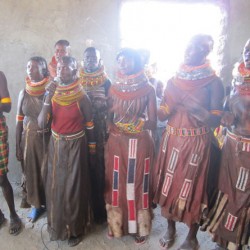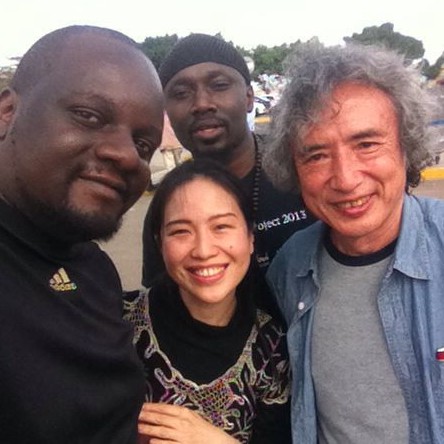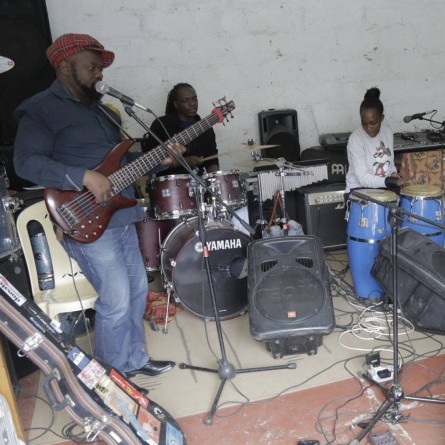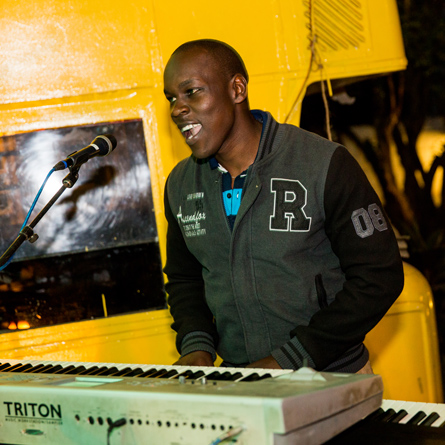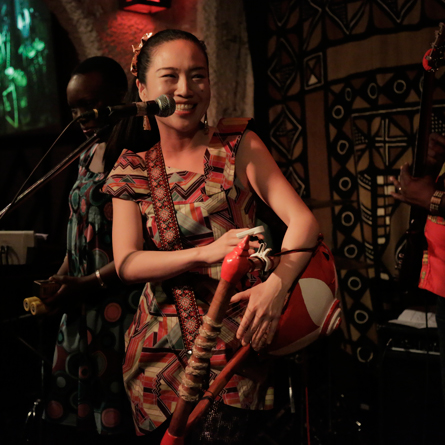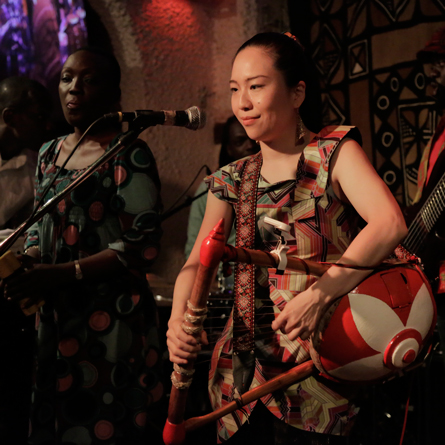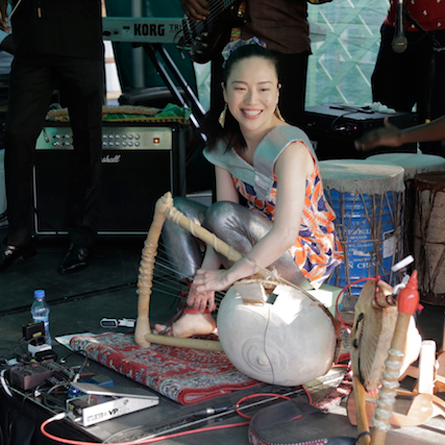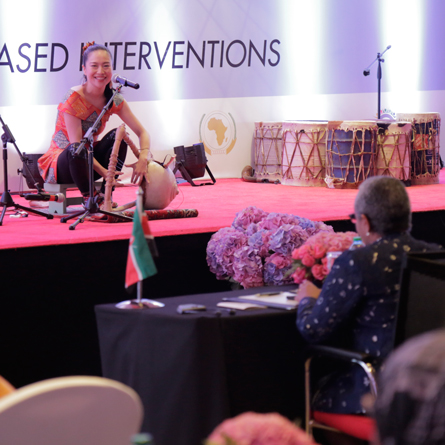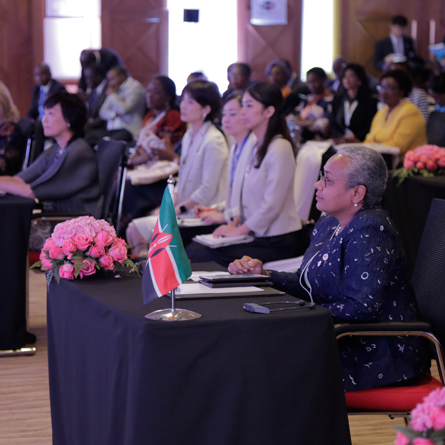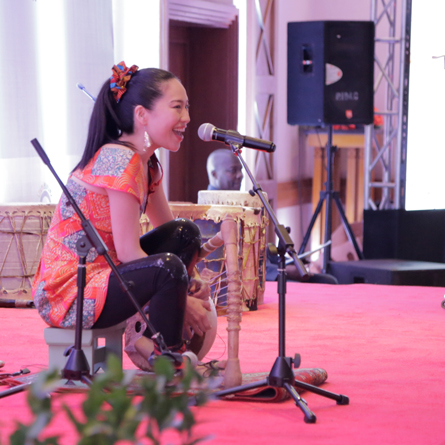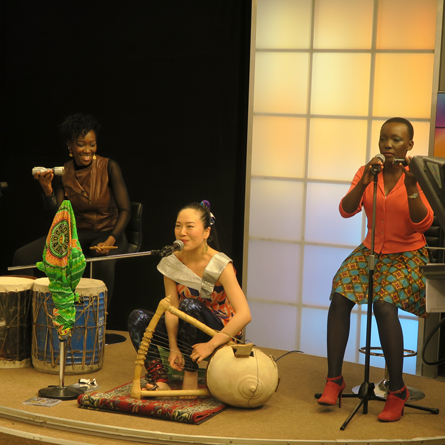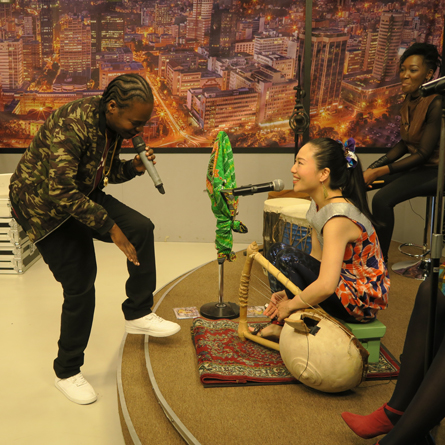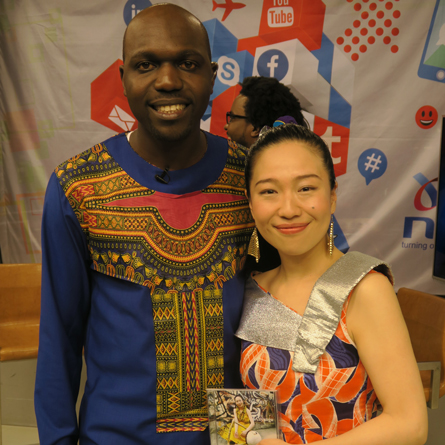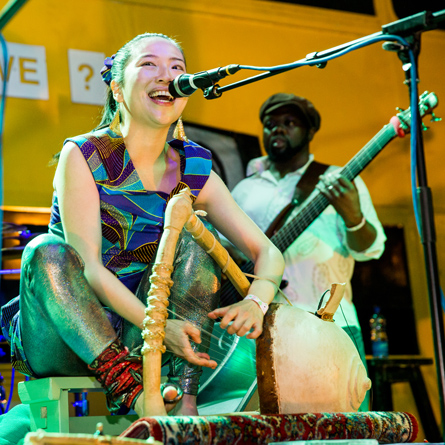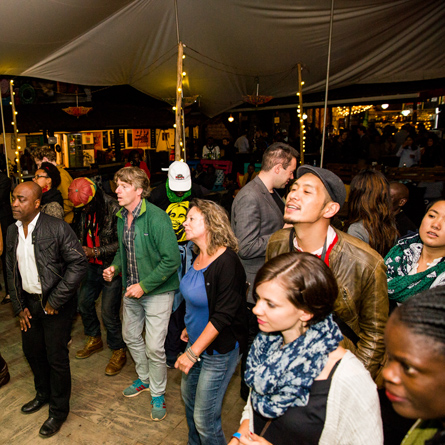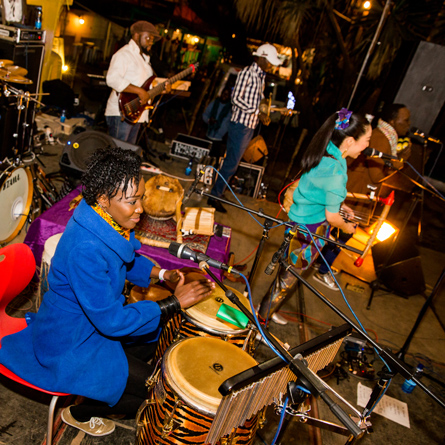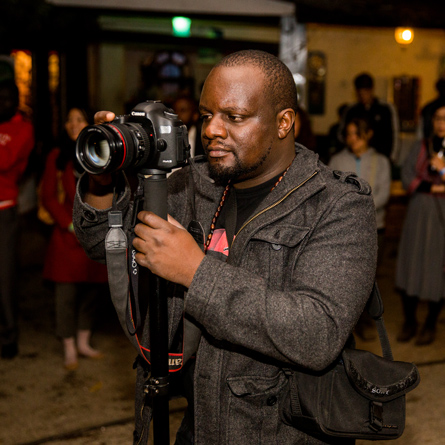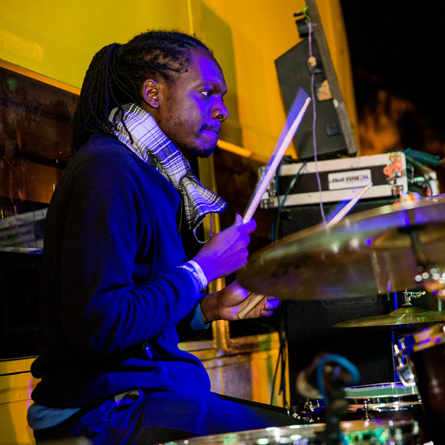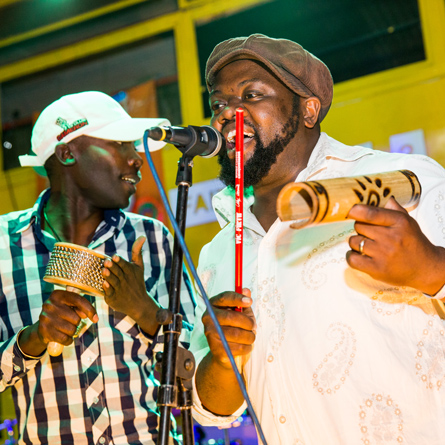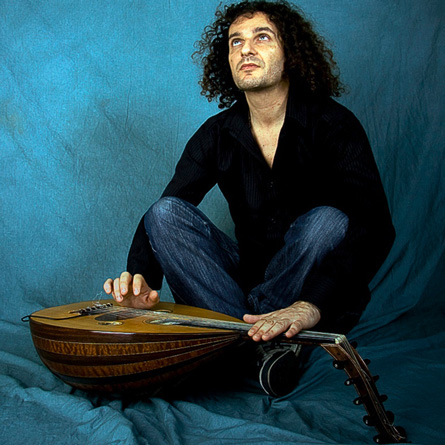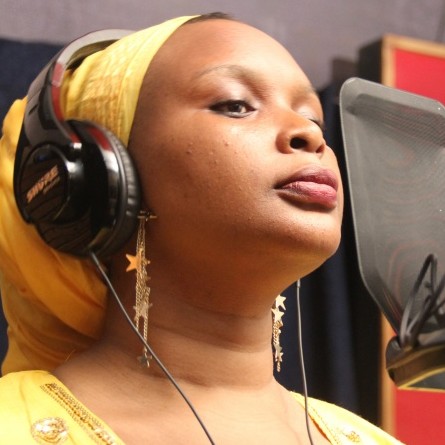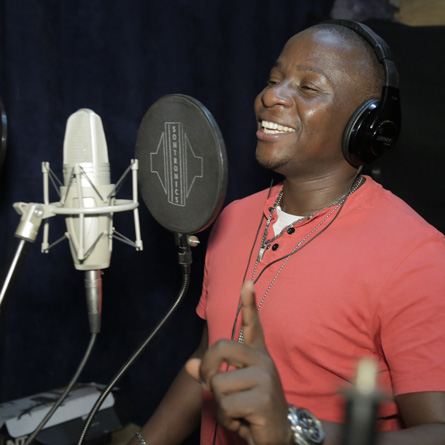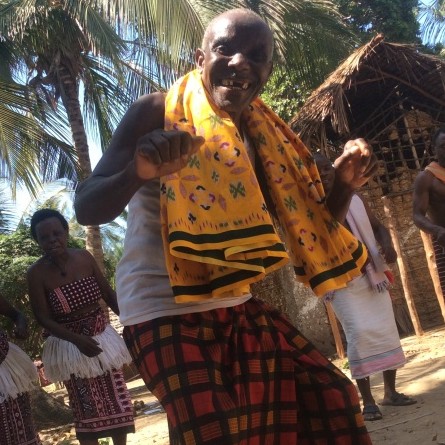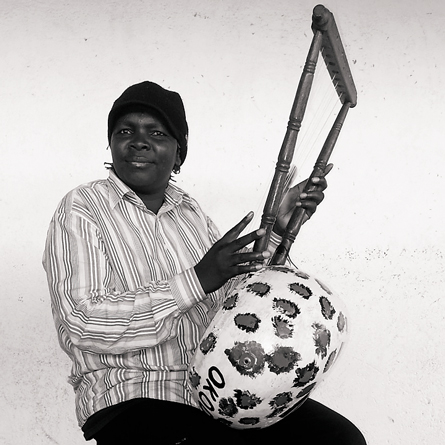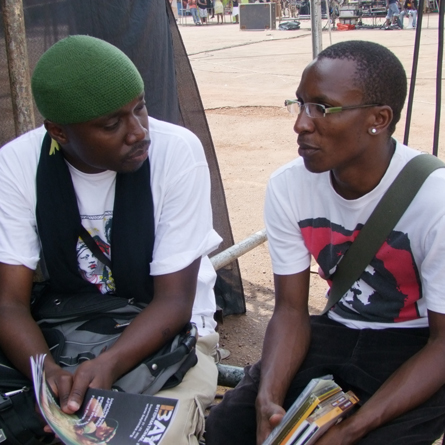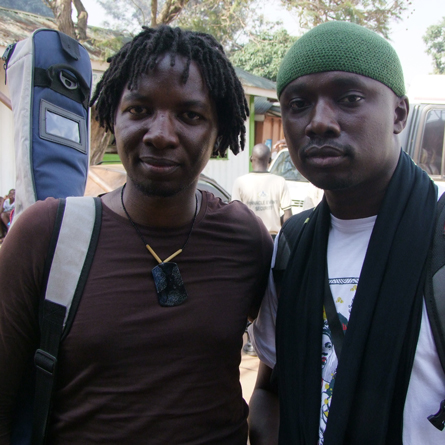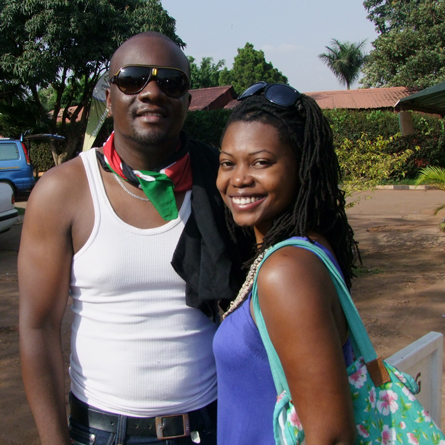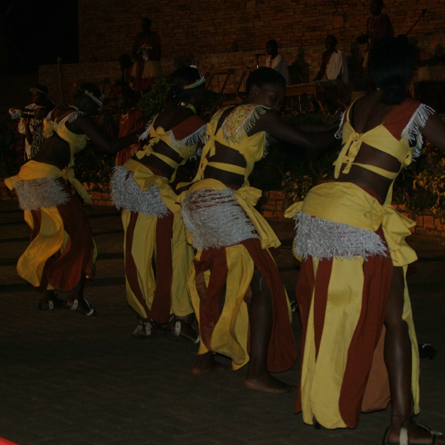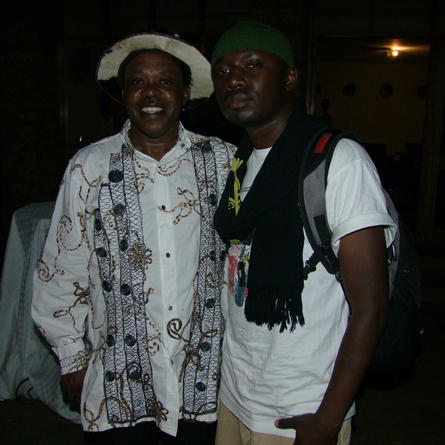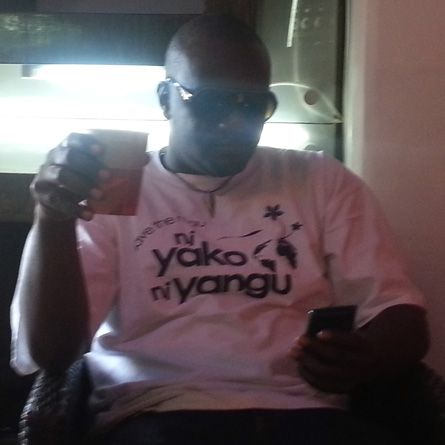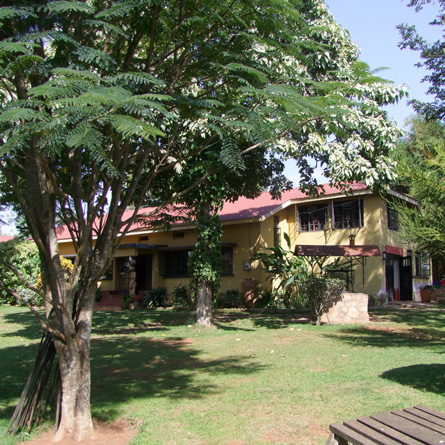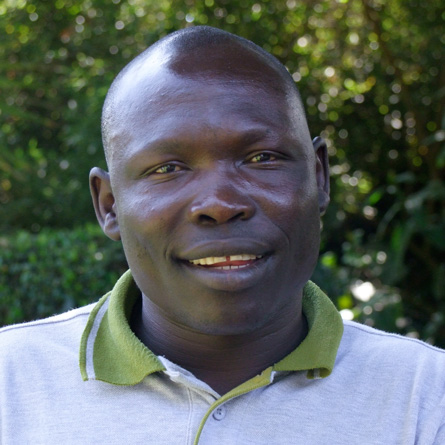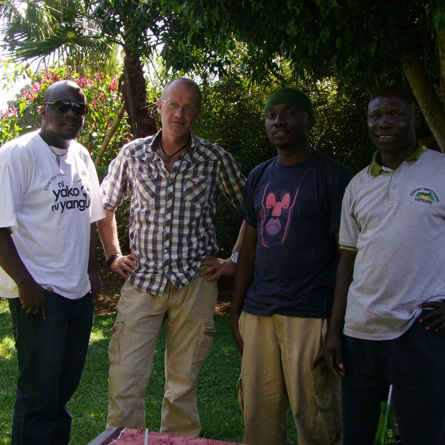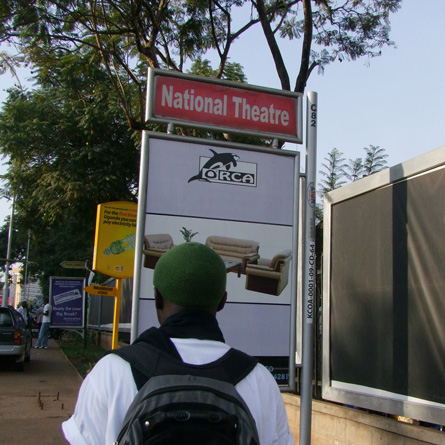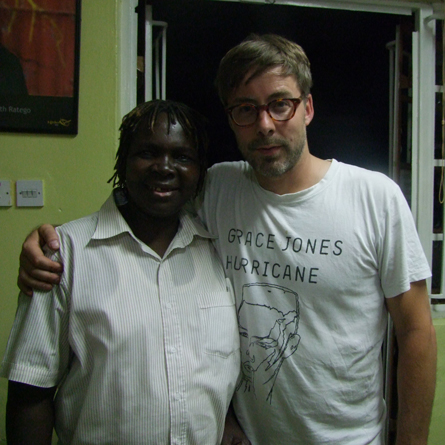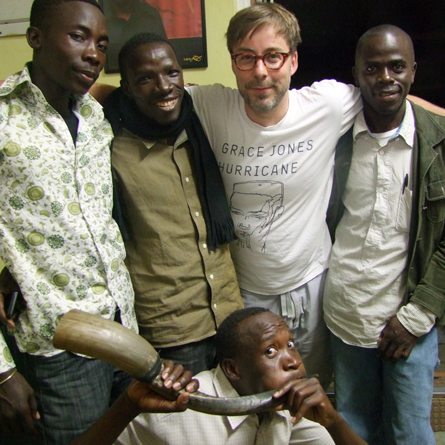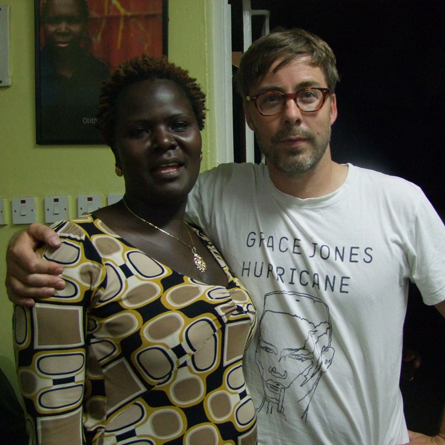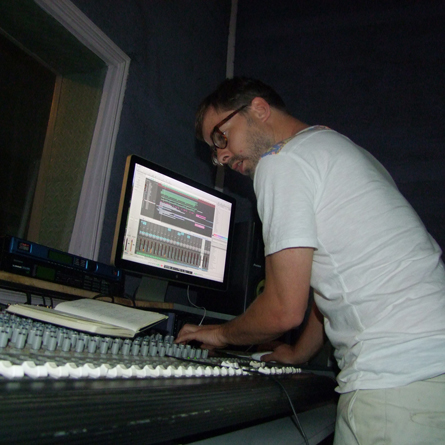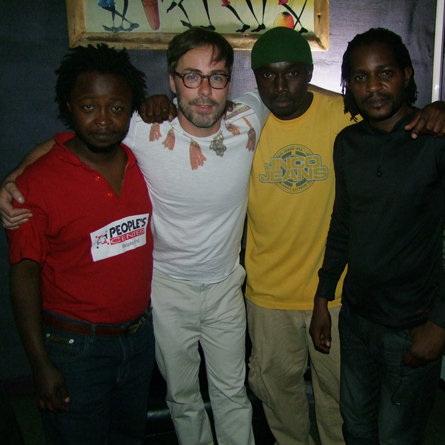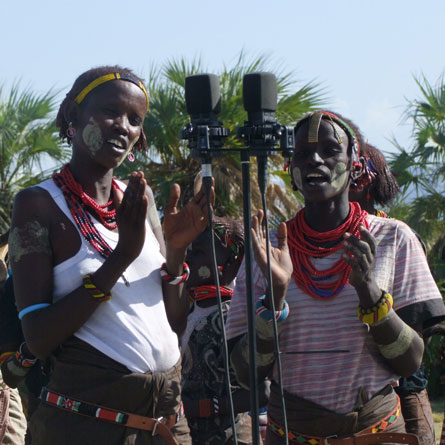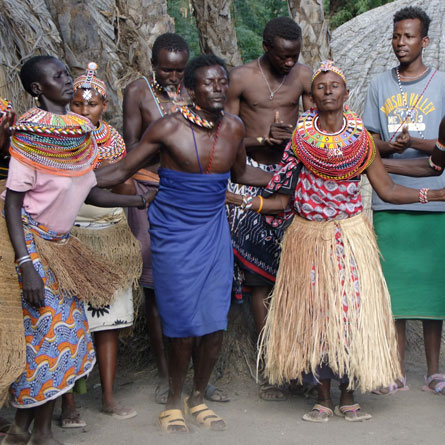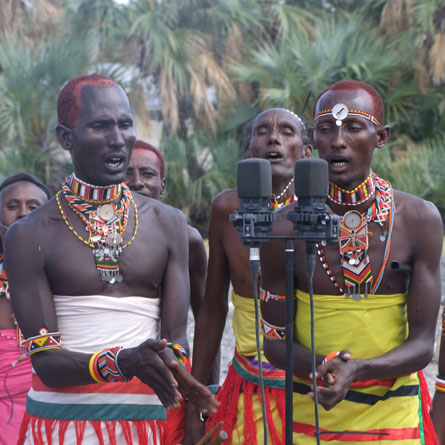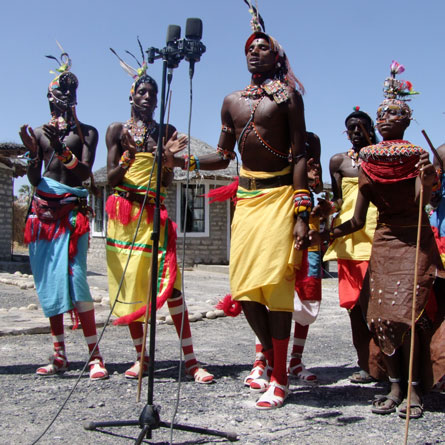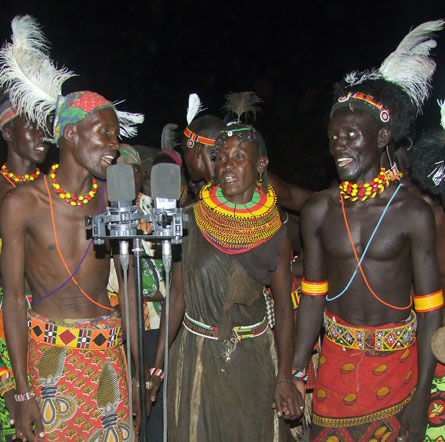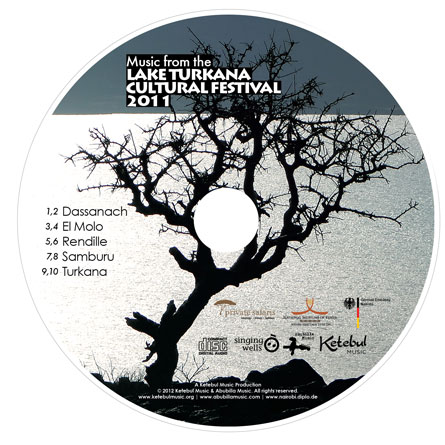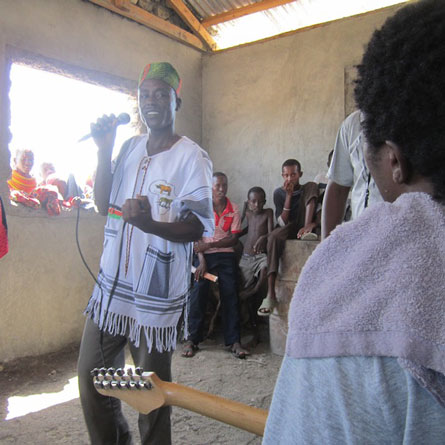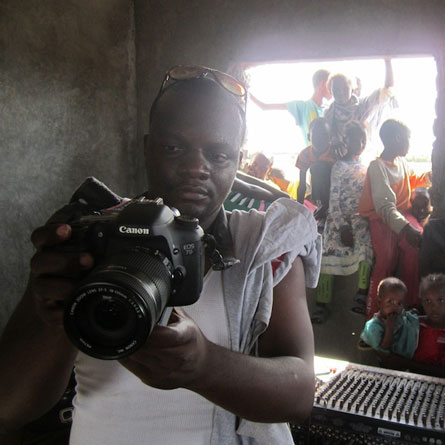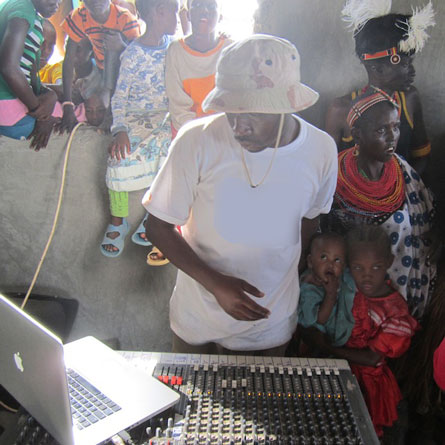Safari Ya Eriko Mukoyama! Anyango Tours Nairobi
Japanese nyatiti diva, Anyango arrived in Kenya on the 19th of August 2016 on a mission to promote her new album, Anyango: The Safari of Eriko Mukoyama. The visit entailed a number of shows in Nairobi aimed at promoting her brand new album.
Rehearsals Day 1… A group of multi-talented musicians converged at Ketebul Music Studios to join Anyango in the first step of the journey.
With Kasiva Mutua on percussions, Ricky Nanjero on bass guitar, Michael Okinyo on the keyboard, Gervais Katumba on drums, Boaz Jagingo playing the orutu; a single-stringed traditional instrument and background vocalist Lydia Ogoti on board… Anyango’s new band was complete!
On the 25th of August Anyango had her first show at Thursday Nite Live @ Choices where she wowed the crowd with her brilliant live act.
The four-hour live performance, filled with beautiful nyatiti sounds and the angelic harmonies of Anyango and her band doubled up as the official launch of Anyango’s album, Anyango: The Safari of Eriko Mukoyama.
The album consists of 15 songs in total including a collaboration with Kenge Kenge Orutu System, a traditional band from Kenya.
The song entitled ‘Anyango Nyar Japan Meets Kenge Kenge’ is a song Anyango wrote right after the Fukushima earthquake tragedy in Japan. It is meant to encourage the human spirit of resilience. Kenge Kenge infuse a strong traditional musical element to this song, expressing the same sentiment in Dholuo; a local language from Nyanza, Kenya.
On the 26th of August Anyango performed at the Hideyo Noguchi Africa Prize Reception at The Hilton Hotel in Nairobi.
The Prize is awarded to individuals with outstanding achievements in combating various infectious diseases in Africa or in establishing innovative medical service systems. It is awarded after every five years.
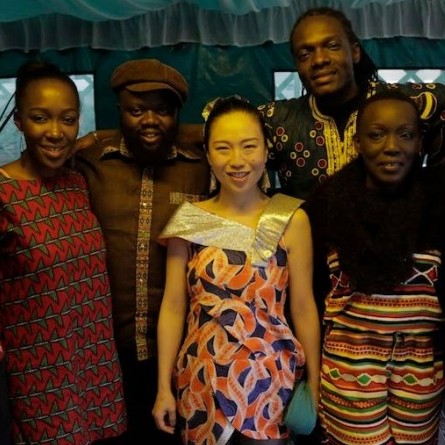
Left-Right: Kasiva Mutua, Ricky Nanjero, Anyango, Gervais Katumba and Lydia Ogoti at The Hideyo Noguchi Peace Prize reception
27th of August 2016, Anyango performed at a symposium held for the First Ladies of Africa at the Intercontinental Hotel, Nairobi during the Tokyo International Conference of African Development (TICAD IV)
The event was hosted by H.E. Margaret Kenyatta, First Lady of the Republic of Kenya and H.E Akie Abe, First Lady of Japan.
On 2nd September 2016 Anyango appeared on The Trend Live with Larry Madowo, a live entertainment television show aired every Friday on NTV Kenya. She was interviewed and did a short performance with an all-girl 3-piece band consisting of Kasiva Mutua, Lydia Ogoti and herself.
During the interview Anyango did an impromptu collaboration with Jua Cali, a renowned Kenyan hip-hop artist. Jua Cali rapped impressively over Anyango’s nyatiti sound.
To wrap it all up Anyango,s final show was at The Alchemist, Muthurukishion 3: Strings of The East. This went down on the 3rd of September 2016.
This 3rd edition of Muthurikishion featured Anyango who plays the nyatiti as well as DBass Ganun from Tanzania who plays the ganun, both string instruments from East Africa and the Middle East respectively, hence the name ‘Strings of The East’.
And if the music is good… You dance!!!
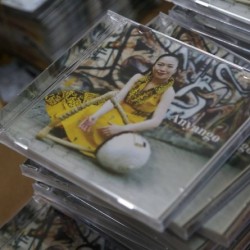
Oud Meets Swahili & Mijikenda Music
Ketebul Music and Alliance Française de Nairobi have been long standing partners in the project ‘Spotlight on Kenyan Music,’ which promotes and develops musical innovation that is rooted in diverse musical traditions of Kenya. To date, the Spotlight program has released 6 compilations. These recordings continue to serve as a bridge linking tradition and modernity.
In the month of May 2016, starting 9th -14th, Ketebul Music and Alliance Française de Nairobi will team up on a creative music workshop project; with the working title Oud Meets Swahili and Mijikenda Music. This project will bring Kenyan artists from the Swahili and Mijikenda cultures of the Kenyan coastal region to collaborate with the Franco-Tunisian oud maestro, Jean-Pierre Smadja, alias Smadj to compose, perform and produce music that will engage with the audiences.
This project intends to help uncover the link between the oud and the music from the Swahili and Mijikenda cultures found on the Kenyan coast. Smadj will be joined on this project by taarab singer Mwanate Kibwana from the group Lelele Africa and mwanzere singer Mohamed Said Ngana, better known as Bado, the son of legendary mwanzere singer Nyerere wa Konde.
The project, which is supported by the Instut Francais under their IFPROG umbrella, will feature a 3 day creative workshop which will culminate with 2 days of studio recording of the material generated at the workshop, and a 2 hour show at the Alliance Française de Nairobi gardens on the 14th of May 2016.
IFProg is a digital platform for cultural and artistic projects taking place abroad to deposit them in the annual device support of the French Institute.
More details on participants and schedule of the project will follow in due course.
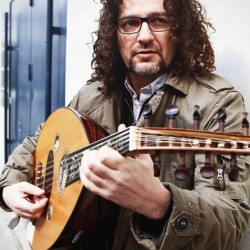
The Retracing Series on KBC Tv: Kikuyu Popular Music
Over the past 3 weeks Ketebul Music in conjunction with KBC TV have been airing our Retracing series of documentaries. These are aired as a 13 part series every Sunday at 5:30pm on KBC channel one.
The Retracing Series is based on research documentaries on the origins and development of different genres and styles of music from Kenya. So far we have documented;
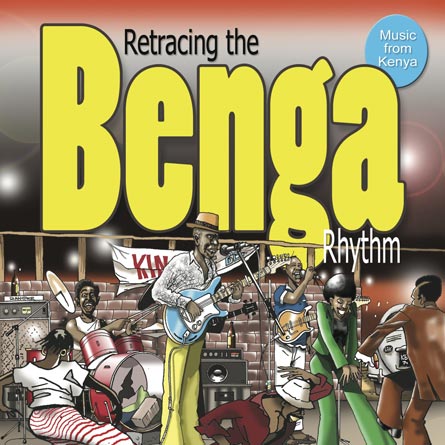
Benga: Retracing The Benga Rhythm, (which was aired over the first 3 weeks)
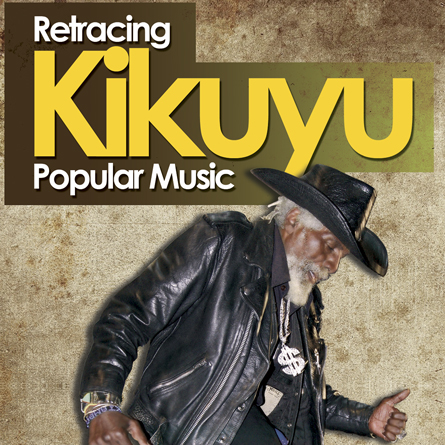
Kikuyu Popular Music: Retracing Kikuyu Popular Music
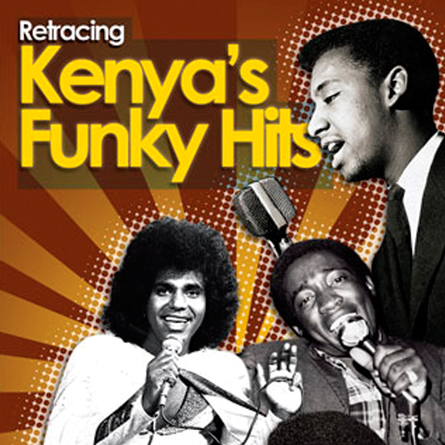
Funk: Retracing Kenya’s Funky Hits
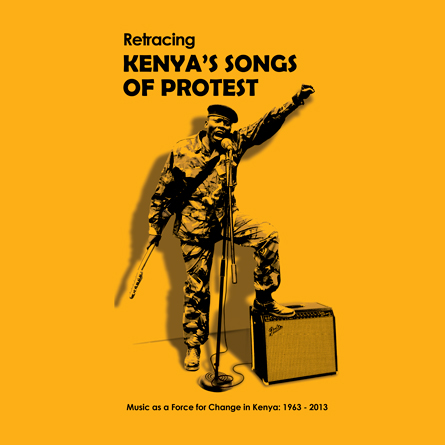
Protest music: Retracing Kenya’s Songs of Protest
This coming Sunday, we shift focus from “Retracing the Benga Rhythm,” to “Retracing Kikuyu Popular Music.”
Stay tuned on Ketebul Music website and social media for updates and extracts from the Kikuyu popular music edition, and be sure to join us this Sunday at 5:30pm on KBC Channel One for the first installment of this edition.
All the editions of the Retracing Series of documentaries are available at Ketebul Music Studios and selected outlets. For inquiries and delivery within CBD call +254 720 561 198
info@ketebulmusic.org
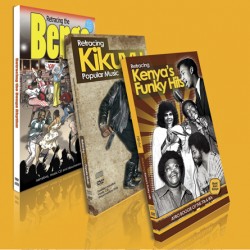
Welcome to Music Monday!
Owing to the fact that it is the first day after the weekend and the beginning of the ‘official’ work man’s week, Monday is normally viewed in sort of a negative light. With terms like ‘Monday Blues,’ in reference to having to get over the effects of an easy going weekend, Mondays are dreaded by both young and old be it in school or the work place.
Well, in an effort to break the ‘Monday Blues’ stigma, and to give you a positive outlook to the day, we would like to welcome you to Musical Monday(s)!
We will be featuring stories, music and profiles of musicians and artistes that we like. This will not be a critics review, but just us pointing out the music we like: more like a musical compass pointing you out to the ‘right’ direction from our perspective.
To start us off this Monday, we will feature the group Sarabi.
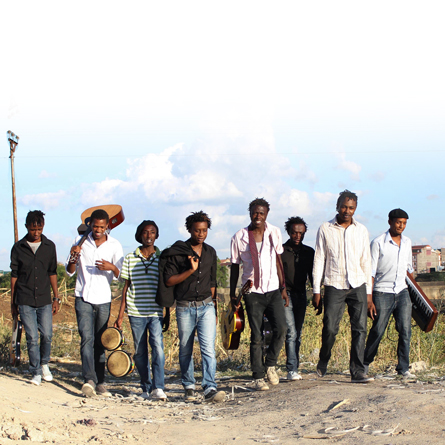
Sarabi
Sarabi is Swahili for Mirage. It also means, Imagination, Vision and Creation. They describe their music as a vivid representation of our society, and influenced by the everyday happenings. It features traditional Kenyan rhythms, Benga and a blend of Western sounds.
Sarabi was formed in 2005 and has in the recent years emerged as one of the most exciting and sought after bands in Kenya. The Band is made up of 8 young men, hailing from the Eastlands area of Nairobi, who started playing music before they were even teenagers. They have worked together and grown into an accomplished and solid band, with very high levels of professionalism, that is sometimes lacking in bands who are even twice their age.
They have been described by the press as “The next force in Kenyan music,” (Drum Magazine, Oct 2007) and as being “The new face of AFRO-Fusion in Kenya” (BUZZ Magazine, August 2013).
Sarabi released their debut album titled “OYAORE”- A new beginning in July 2013.
They will be on stage this Friday the 31st of January 2014, performing at the launch of Ketebul Music’s Retracing Kenya’s Songs of Protest.
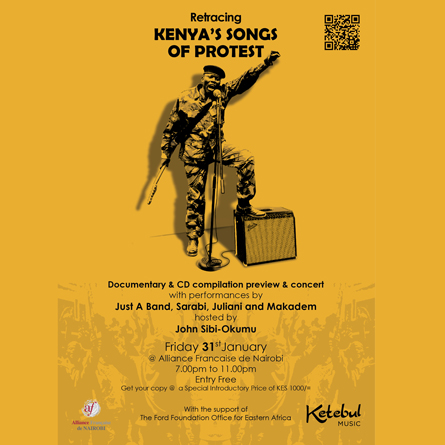
Retracing Kenya's Songs of Protest E Poster
Be sure to join us and catch Sarabi live on stage where they will perform Fwata Sheria among other of their popular songs.
CLICK HERE for more on Sarabi
CLICK HERE for more on Retracing Kenya’s Songs of Protest
CLICK HERE for details on Retracing Kenya’s Songs of Protest launch concert
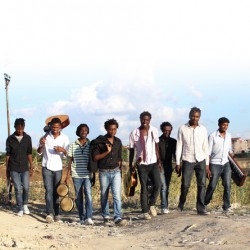
Welcome to Throwback Thursday!
Welcome to Throwback Thursday!
We dedicate our Thursdays to reviewing and revisiting our past projects, events and generally things we have been involved in.
Today, as we are gearing up to release our latest edition of the Retracing series titled Retracing Kenya’s Songs of Protest, we shall revisit one of the earlier editions in the series: Retracing Kikuyu Popular Music.
Retracing Kikuyu Popular Music is the 2nd edition in the Retracing series. It was officially released on Friday 17 December, 2010. The launch was held at Alliance Francaise de Nairobi and included a concert that featured performances by non other than the legendary musicians Joseph Kamaru and DK Mwai.
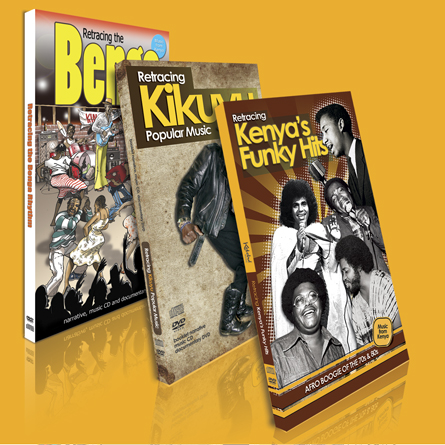
The Retracing Series
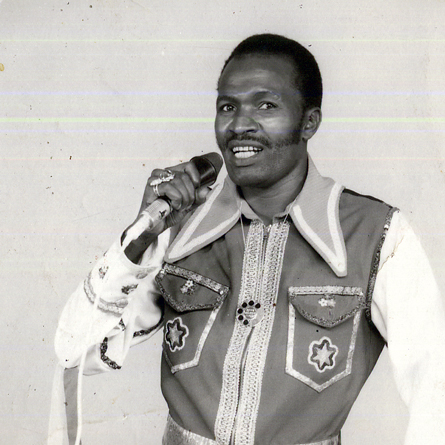
Joseph Kamaru in the 1970s
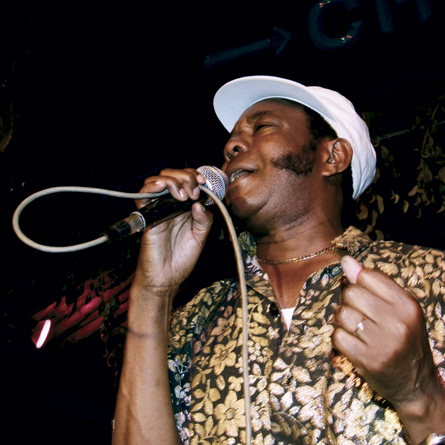
Dk Mwai
The project traced the roots of Mugithi and aimed at answering the following questions:
Why did Gospel music become such a big part of Kikuyu popular music?
Is it true that there is a Jim Reeves, Don Williams or Kenny Rodgers cassette in the home of every music-loving Kikuyu?
Why is it that amongst the Kikuyu rural elite and urban middle-class, one of the nicknames given to a fast-talking know-it-all is “Jimmie Rodger?”
How did the name of the American “father of country music” – Jimmie Rodgers – come to be inscribed in the spoken idiom of the Kikuyu of the 21st Century? Why does Kikuyu urban guitar music carry the riffs of American country music?
Why do virtually all Kikuyu popular musicians wear American Stetson hats and Denim suits, and occasionally, a leather jacket and studded belt?
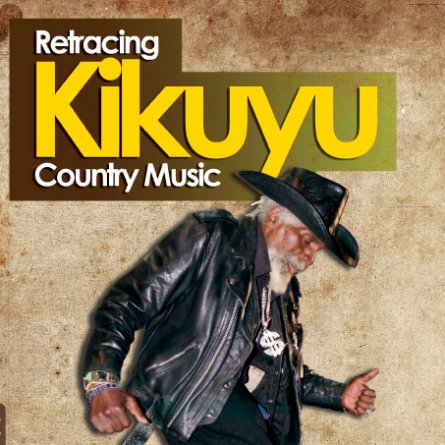
Retracing Kikuyu Popular Music Front Cover
Retracing Kikuyu Popular Music takes a journey into the roots of Kikuyu music tries to answer these and many other questions. The answers may not be straightforward but in trying to unlock the riddles, Ketebul Music avails part of the archive of Kikuyu popular music in new and accessible formats.
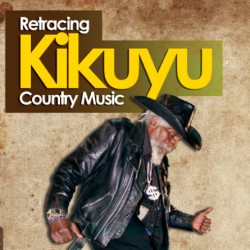
Olith Ratego Heading To Dusseldorf, Germany
Ketebul Music artist Olith Ratego is heading to Dusseldorf in Germany on Friday the 16th of November, for a series of performances with German choreographer Morgan Nardi.
Olith Ratego and Morgan met in Nairobi when Morgan was in town for the solos and duets dance festival. After a chance meeting at the Godown Arts Centre, Morgan invited Olith to perform with him at the Visa Oshwal centre. Impressed by the outcome of their performance and Olith’s music, Morgan promised to work with him again in future.
The performances will feature dance pieces choreographed by Morgan Nardi to Olith Ratego’s song titled Anindo. During the performances which are coproduced by Tanzahaus NRW, Olith Ratego will sing and play his self made lyre live as Morgan Nardi and company perform their dance pieces.
Olith Ratego will depart Nairobi for Dusseldorf on the 16th of November for a series of reheasals with Morgan Nardi before the performances which are scheduled for the 22nd, 23rd and 24th of November.
Kudos to Olith Ratego for flying the Ketebul Music and Kenyan flags high!
CLICK HERE for information on Morgan Nardi.
CLICK HERE for information on Tanzhaus NRW
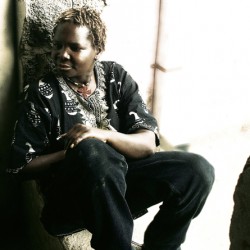
Singing Wells Project: Music of Northern Uganda – Recce Day 02: 12/09/23
By Stefano
Kampala – National Theatre: Bayimba Cultural Festival
The next day after a long night of no sleep owing to the noise from the street seeping into my room through the walls and windows, we have a hearty breakfast at the Hotels dining room. If there was any consolation for the sleepless night, then the hearty breakfast more than made up for it. The menu consisted of potatoes, beef stew, fried eggs of choice, sausages, toast and assorted beverages.
We then jumped into a special hire outside the hotel and headed out to the National Theatre to make our appointment with Faisal as planned on the previous day.
Faisal was understandably a busy man that day, seeing as it was the final day of the festival. We had to patiently wait for him to break away from his duties before he could meet with us.
While he attended to his duties, he introduced us to a number of musicians who were at the festival grounds, giving us a chance to network and find out more details about the music from the North.
Some of the musicians we met and chatted with were:
Moses Matovu
A sax player and band leader of Afrigo Band. Afrigo band had been listed in a report by on of our research contacts, Peter Hoesing, as being one of the groups we should try see while in Kampala and probably get some information from the band members
Moses admitted that he was not that well informed about music from the North. He however mentioned a name that kept popping up in most conversations we were having about music from Northern Uganda: Sam Okello Kelo.
Sam Okello, formerly of Ndere Troupe but now with a group called Mizizi had also been mentioned by Peter Hoesing and Godfrey Lubuulwa as someone who would have a wealth of information and experience with music from the North.
Kaz Kasozi
Kaz Kasozi is a musician and producer and the music programmes coordinator for Bayimba Cultural Organization. He was also Tshilas producer: one of the prospective artists we were targeting for our influences programme.
Kaz said he had developed a few contacts in Gulu, Soroti and Lira, and he promised to send me their contacts as son as he had access to his computer later that evening.
He also mentioned that music from Gulu had been adulterated extensively by outside influences and was thus difficult to find a purely Acholi traditional group in Gulu. Like Jan and Dnalega before, he also recommended that we visit Arua.
Kaz also made an interesting observation that most traditional music instruments from all over Uganda were more often than not made in Jinja which was to the eastern side of Uganda.
Tshila
Tshila is a Ugandan singer, songwriter and guitar player that Victoria from Abubila Music had come across being interviewed on an online programme by the BBC called Africa Beats.
Victoria had recommended we check her out as a prospective influences artist. We were lucky to find her at the festival grounds. She had already heard from Faisal that we were interested in meeting her. We had a brief discussion with her highlighting Singing Wells and our influences programme within Singing Wells.
She expressed a strong interest in taking part in the programme. We agreed to meet again when we got back to Kampala from up North.
Meeting with Faisal
We finally got a chance to sit down with Faisal in the late afternoon. From our meeting with him we gathered the following information:
Sam Okello
Sam Okello was probably in UK or Holland and would be back in Kampala from the 29th of September.
Faisal will initiate contact and introduce us via email
He also gave me Sam’s number
Arua
Arua has a large Nubian community with beautiful Nubian music. He also mentioned a xylophone playing group in Arua whose contacts he promised to send to me later that evening.
Gulu
Recommends we visit TAKS Centre in Gulu and meet with Joyce Laker and Daudi. TAKS Centre were Bayimba’s cultural partners who help them program traditional artists and groups from Gulu when Bayimba do their regional festival.
He also recommended recording a musician from Gulu called Peter Otim.
Kampala
Suggests we record a few Kadongo Kamwe groups from Kampala.
Will set up meetings and auditions with 3 Kampala based groups on Thursday at Bayimba offices. He mentions The Planets and 2 other groups for the meetings.
Fixer for the recce
Faisal introduces us to Sylvester, the youth programmes coordinator for Bayimba Cultural Foundation. Sylvester has runs programmes in Arua and Gulu for Bayimba. We ask him to travel with us Monday and he agrees.
Ndere Centre, Ntinda – Ndere Troupe
After our meeting with Faisal, we hooked up with Godfrey at the festival grounds. We had to make a dash to Ndere Centre in Ntinda to catch the evening peformance by Ndere Troupe. It was a half an hour drive to Ntinda and we got there just as the troupe was finishing their first piece.
Ndere Centre is well built and very impressive. There is lush greenery al around and the performances are held in a large outdoor amphitheatre. I later found out that the centre plays host to up to 65 dancers and dance trainees at any given time.
The troupe gave a very exhilarating performance that was a mix of dace, music and oral narratives. They played songs from all the regions and tribes of Uganda. The troupe Director, Rwangeyezi Stephen gave a very captivating oral narrative of each tribe as an intro to every song, touching on the traditions, customs and instruments.
After the performance by Ndere Troupe, Godfrey introduced us to Rwagyezi. We gave him a brief account of Singing Wells and told him we were interested in recording Ndere Troupe as part of our project. We then exchanged contacts with the aim of continuing our discussions further via email correspondence.
Kampala – National Theatre: Bayimba Cultural Festival
Back at the National theatre late that evening, we had a brief meeting with Sylvester to work out logistics for the next day and where we would pick him up from. We were planning to depart Kampala as early as possible the following morning.
We stayed on till the closing act of the festival seeing as it was the final night, before heading back to the hotel.
Click for more information on Ndere Troupe
Click here for more information on Afrigo Band
Click here for more information on Tshila
Click here for more information on Kaz Kasozi
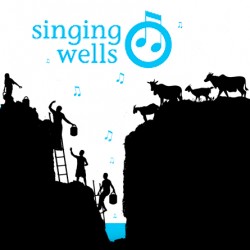
Singing Wells Project: Music of Northern Uganda – Recce Day 01: 12/09/22
By Stefano
In preparation for our November – December Singing Wells Project covering Northern Uganda, Patrick and Steve traveled to northern Uganda via Kampala on a fact finding mission to map out the region and identify performing groups.
The recce was aimed at getting information on the following:
1.Logistics
Air travel
Road Travel and state of the roads
Accommodation
2.Support
Fixers & Cultural Partners
3.Music Performers
Groups
Locations
Singing Wells is a partnership project by Ketebul Music and Abubilla Music that aims at archiving and documenting the rich musical traditions from eastern Africa
Nairobi
Our journey begun early Monday morning with a taxi ride to JKIA. Our flight was scheduled for take off at 7.55am meaning we had to be at the airport at 6.30am.
We arrive at the airport at 6.15am and we are lining up at the check in counters by 6.30am. Due to overbooking and much to our disappointment and inconvenience, we are transferred to a later flight set to take off at 12.55pm.
We spend the entire morning at the airport trying our best to drown our disappointment in coffee and the day’s newspaper.
Entebbe
Finally after a smooth flight (Patrick is not a fun of flying so he might say different) we arrived at Entebbe Airport at 2.10pm. After clearing with customs, which took no time at all, we find Jan’s driver was waiting for us outside the arrivals area.
A short 15minutes drive later and we are seated with Jan at the Airport Guesthouse Entebbe having refreshments and a brief meeting with Jan before proceeding to Kampala. Although this was our first time to meet face to face, this was not our first encounter with Jan.
Jan Willem is the manager of the Airport Guesthouse in Entebbe as well as the Travelers Resort in Kisoro where we had been to in 2011 during our work with the Batwa. He had been one of our logistical partners on the ground giving us information with regards to accommodation and transportation.
We were also lucky that some of the staff at the Guesthouse were very helpful with information about the regions we intended to cover during our visit.
Meeting with Jan, Mary, Rose, Charles and Dnalega Bonnars
From our meeting with Jan we gathered the following;
1.Roads
The roads heading north are in poor state. Jan recommends using land cruiser vehicles for our trip.
There is a new road from Gulu to Soroti but it is rarely used
Drive time from Kampala to Gulu approx 6hrs
Drive time from Gulu to Pakwach approx 4hrs
Drive time from Pakwach to Lira approx 6hrs
Might not be possible to cover Pakwach to Lira on the same day as planned
2.Accommodation
Entebbe
Jan offered the SWP team a discounted rate at the Guesthouse for later that year
Kampala
Good hotels in Kampala would cost more than we had anticipated
Gulu
Accommodation might be a challenge
Few good hotels in the region
Recommends Acholi Inn
Pakwach
Jan has a lodge in Pakwach, Murchinson Falls
He would give discounted rates for SWP
I make a mental note to look at possibility of altering our itinerary so we spend a night in Pakwach instead of Lira.
Lira
Jan was not aware of any hotels in Lira as it was not a common sleep over town.
3.Music and Communities In The Region
Gulu
Tribe Acholi
Instruments: Adungu (traditional harp that comes in varying sizes)
Pakwach
Tribe Alur
Instruments: Agwara (wooden trumpet)
Jan recommends we pay a visit to the manager of Global Village who might be helpful with information on Alur culture and might help identify music groups
Lira
Tribe langi
Instruments: Keme (thumb piano), Bul (drum)
Mary informs us that traditional music in Lira is on the decline and groups might be hard to find
Soroti
Tribe Ateso & Kumams
Instruments: Ateus (a drum similar to the Baganda short drum), Akogo (thumb piano)
Rose describes the dressing of performers as they do the Akogo dance: women wear kangas tied above their breasts and men wear shorts. She recommends we visit the ‘Emorimori’ (tribal chief) for more information.
Arua
Tribe Lugbara
Instruments: Ari (drum), Adungu, Pita (thumb piano)
Arua is not on our itinerary but Dnalega Bonnars describes the music of the Lugbara from Arua with such impressive detail that we are left considering adding Arua to our itinerary.
The Lugbara perform a host of different styles some of which are exclusive to certain age sets and sexes. He describes a dance called Koro that is performed exclusively by the elderly using the adungu and ari. The performers are dressed in special kangas similar to the Ateso for the women and the men wear shorts. They also wear feathers on their heads and shakers on their upper arms and ankles. Dnalega calls it the most beautiful dance. For a man who started off by saying he didn’t know much about the music of the Lugbara, Dnalega’s description of the Lugbara music leaves us with no doubt that we have to visit Arua and witness a performance by the Lugbaras.
Kampala
After the meeting with Jan, we thanked him and his staff for their hospitality and information and departed for Kampala.
Jan had called us a taxi, or as they call them in Kampala, ‘special hire’ and instructed the driver to assist us find suitable accommodation in Kampala.
The distance from Entebbe to Kampala is listed as approximately 40km, but the drive takes much longer and we are left doubting the accuracy of that information. One and a half hours later we arrive in Kampala city centre and we ask our driver to help us find a forex bureau before finding us a hotel. We find most bureaus close early on the weekend. Luckily there was one that operates late at the Nakumatt supermarket complex.
Because we had scheduled a number of meetings at the National Theatre and we also intended to network during the Bayimba Festival, which was taking place at the theatre over the weekend, it was important for us to find accommodation close to the theatre. We informed our driver as such and he said he knew just the place that would be ideal for us. He drove us into an area that resembled Nairobi’s River Road and we ended up checking into ‘’one of the best hotels in Kampala,” according to our driver. By the next morning, I did not share his sentiments at all. While the rooms were spacious and comfortable, the walls were paper-thin. Add to that the noise from the busy street below and finding sleep was a battle that I lost miserably.
Kampala National Theatre: Bayimba Cultural Festival
After we checked in to the hotel and a quick shower to freshen up, we walked down the street and jumped into another special hire and headed to the National Theatre for the Bayimba Festival.
It was 7pm and we were anxious to catch the performance by Jackie Akello who was one of our ‘influences’ prospects. Seeing her on stage would help in gauging her abilities and style and help in making the decision of whether she was the ideal candidate to join us for our trip in December. We however end up listening to her two last numbers while lining up outside at the entry to the theatre. The line of revelers attending the festival was quite long. The sound was pretty good though and apart from the fact that we didn’t actually see Jackie’s performance, what we heard was quite impressive. We later tried to secure a brief meeting with her but we were unable to because she was held up in a PR exercise for on of the festival’s sponsors. Alex from Bayimba promises to secure us a meeting some other day.
We met briefly with Faisal Kiwewa, the founder and Director of Bayimba Festival and set up an appointment for the following day. Faisal was one of our cultural partners in Kampala and he would help us with contacts and information on some of the areas we intended to visit.
We also met and spent some time with Godfrey Lubuulwa, a Kampala based musician from the Baximba Waves. Godfrey had been one of the participants at an accordion workshop that we had held in Nairobi earlier. He was also one of our contacts on the ground helping us identify groups and performers from the regions we intended to visit. He gave us information on one Sam Okello Kelo, a musican formerly of Ndere Troupe who was now with a group called Mzizi Ensemble. Sam was very knowledgeable about the music of Uganda in general and according to Godfrey, he would make the ideal guide and fixer for us during our travels up north. Godfrey informs us that Sam might be out of the country but he would initiate contact with him on our behalf.
The end of the festival performances for the night also marked the end of our first day in our Singing Wells recce. After a brief night in the town and a cold drink to wind up the evening at a local club in Kampala, we retired back to our hotel for some much deserved rest.
Stay tuned for more posts from the recce to northern Uganda.
Click here to view more pictures from the recce on Facebook
Click here for more information on Singing Wells
Click here for more information on Abubilla Music
Click here for more information on Airport Guesthouse, Entebbe

Felix Buxton Of The Basement Jaxx @ Ketebul Music Studios
By Stefano
Last week, Ketebul Music was honoured to host Felix Buxton, one half of the UK dance and electronic music duo, Basement Jaxx.
With seven studio albums to their credit, Basement Jaxx are one of the most successful and popular UK bands and deejays to date. The duo are also highly in demand internationaly as remixers. Some of their most notable remixes include ‘4 My People‘ by Missy ‘Misdemenour’ Elliot ‘Like I love You’ by Justin Timberlake and ‘She Wants To Move’ by N.E.R.D to mention but a few.
Felix who had performed at the Rift Valley Festival 2012 on the 2nd of September, spent a couple of days at Ketebul Music Studio A recording and working with some of Ketebul Music signed and affiliated artists. He recorded vocal and musical performances by Olith Ratego, Judy Bwire, Kenge Kenge Orutu System, Onyango Jagwasi (Extra Golden), The Safari Voices International Choir, Evany (Mangelepa) and the duo of Francis and Irungu. He also recorded vocal performances of our very own Priscah Wairimu and Willie ‘Bembe’ Gachuche. Felix plans to use some of the material he recorded for future projects by the Basement Jaxx. Felix’s visit and sessions were organised by longtime Ketebul Music collaborator and partner DJ Yam Yam of No Nation.
Felix who is also an accomplished sound engineer and producer, also got a chance to interact with Ketebul Music personnel and engineers who assisted him in recording his sessions.
With Felix’s visit closely following our just concluded workshop on the accordion that brought together musicians from France, Kenya, Tanzania and Uganda, Ketebul Music remains at the for front of creating forums and enabling environments for musicians from all over the world to interact with musicans from Kenya. In so doing, we hope to create an awarness to authentic Kenyan music that has so far been lacking from the international limelight.
Pictures by Ketebul Music
For more pictures of Felix’s visit CLICK HERE
For more information on Basement Jaxx CLICK HERE
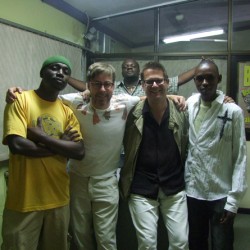
Lake Turkana Festival 2012
By Stefano
In 2011, Ketebul Music under the Singing Wells Project visited Loiyangalani for the Lake Turkana Festival. We recorded music from the different communities that paticipated in the festival, namely the Samburu, the Turkana, the Rendille, the El Molo and the Dassanach.
As a follow uo to that visit, Ketebul Music was again in Loiyangalani for the 2012 edition of the festival. With the support of the Gernman Embassy in Nairobi, we pressed and packaged 100 CDs containing 10 songs from the 5 communites recorded in last years festival. The Cds were presented to the communities during this years festival in an effort to promote better inter tribal relations through music.
Ketebul Music personnel were also accompanied by members of Gravity band, who backed up the 5 communities on stage during festival.
Over a period of two days, Gravity Band rehearsed with the Turkana, the Dassanach, the El Molo and the Samburu in preparation for their performance at the 2012 festival. The performance dubbed ‘Stars Of The Lake’ would also feature Bonaya Doti from Marsabit who tohetherwith his community of the Konso were making their first appearance at the festival.
For more pictures following Ketebul Music personnel throuhg this visit, log on to Ketebul Music’s facebook page here
For mofe on The Lake Turkana Festival 2012 follow this link.
Featured photos by Stefano Sita Nne
